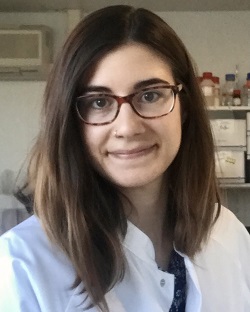
San Raffaele Telethon Institute for Gene Therapy
Retrovirus-host interactions and innate immunity to gene transfer


Innate immunity and nucleic acid sensors are involved in an increasing number of biological processes from antiviral defenses to tissue homeostasis and disease. As all current and emerging gene transfer and editing technologies expose cells to exogenous nucleic acids and/or viral vectors, we hypothesize that host antiviral factors and nucleic acid sensors play a pivotal role also in the efficacy and safety of genetic manipulation. On the other hand, the same sensors that protect us from viral infection and potentially hamper efficient gene engineering can also drive specific human autoimmune diseases when they are inappropriately activated by endogenous nucleic acids. On these premises, we study the molecular mechanisms of host-vector interplay and innate immunity in the context of gene therapy in hematopoietic stem cells (HSC) and other relevant target tissues such as the central nervous system and investigate these pathways in the context of pathological conditions of the central nervous systems and autoimmune diseases. Together, our efforts will provide insight into how nucleic acid sensing and innate immune signaling may affect efficacy and safety of gene therapy approaches in clinically relevant target cells as well as to shed light on how these same pathways may contribute to autoimmune and inflammatory pathologies.
Research activity
Our first aim is to dissect antiviral factors and innate sensing pathways in the context of genetic engineering. Building on our past work, we are addressing vector signaling and innate immune restriction across delivery platforms and in clinically relevant target cells. These basic studies of vector-host interactions will allow modulation of identified host factors or innate sensing pathways in the context of transduction or gene editing with the goal of rendering gene engineering as inert as possible, while maximizing its efficiency.
Secondly, we aim to investigate innate immunity and nucleic acid sensing in the Aicardi-Goutières Syndrome (AGS), a rare monogenic encephalopathy in which aberrant activation of innate sensing is thought to drive disease but the precise molecular mechanisms and cell types involved remain elusive. Here, we use human induced pluripotent stem cells (iPSC) harboring AGS loss of function alleles to dissect triggers of disease in cells of the central nervous system. These studies will provide insight into the pathological cascades in AGS informing the development of targeted therapies and of stealth gene engineering strategies that remain susceptible to similar mechanisms of innate sensing.
§ Unali G, Crivicich G, Pagani I, Abou-Alezz M, Folchini F, Valeri E, Matafora V, Reisz JA, Giordano AMS, Cuccovillo I, Butta GM, Donnici L, D'Alessandro A, De Francesco R, Manganaro L, Cittaro D, Merelli I, Petrillo C, Bachi A, Vicenzi E, Kajaste-Rudnitski A. Interferon-inducible phospholipids govern IFITM3-dependent endosomal antiviral immunity EMBO J. 2023 Mar 27:e112234. doi: 10.15252/embj.2022112234. Online ahead of print.
Giordano AMS, Luciani M, Gatto F, Abou Alezz M, Beghè C, Della Volpe L, Migliara A, Valsoni S, Genua M, Dzieciatkowska M, Frati G, Tahraoui-Bories J, Giliani SC, Orcesi S, Fazzi E, Ostuni R, D'Alessandro A, Di Micco R, Merelli I, Lombardo A, Reijns MAM, Gromak N, Gritti A, Kajaste-Rudnitski A. DNA damage contributes to neurotoxic inflammation in Aicardi-Goutières syndrome astrocytes. J Exp Med. 2022 Apr 4;219(4):e20211121. doi: 10.1084/jem.20211121.
Soldi M, Sergi Sergi L, Unali G, Kerzel T, Cuccovillo I, Capasso P, Annoni A, Biffi M, Rancoita PMV, Cantore A, Lombardo A, Naldini L, Squadrito ML, Kajaste-Rudnitski A. Laboratory-Scale Lentiviral Vector Production and Purification for Enhanced Ex Vivo and In Vivo Genetic Engineering. Mol Ther Methods Clin Dev. 2020 Oct 20;19:411-425.
Piras F and Kajaste-Rudnitski A*. Antiviral immunity and nucleic acid sensing in haematopoietic stem cell gene engineering. Gene Ther. 2020 Jul 13:1-13.
Petrillo C, Calabria A, Piras F, Capotondo A, Spinozzi G, Cuccovillo I, Benedicenti F, Naldini L, Montini E, Biffi A, Gentner B, Kajaste-Rudnitski A. Assessing the Impact of Cyclosporin A on Lentiviral Transduction and Preservation of Human Hematopoietic Stem Cells in Clinically Relevant Ex Vivo Gene Therapy Settings. Hum Gene Ther. 2019 Sep;30(9):1133-1146. doi: 10.1089/hum.2019.016. Epub 2019 May 24.
Petrillo C., Thorne L., Unali G., Schiroli G., Giordano A. M. S., Piras F., Cuccovillo I., Petit S., Ahsan F. Noursadeghi M., Clare S., Genovese P., Gentner B., Naldini L., Towers G., Kajaste-Rudnitski A. Cyclosporine H overcomes IFITM3-mediated innate immune restriction to lentiviral transduction and gene editing in human hematopoietic stem cells. Cell Stem Cell, 2018 Dec 6;23(6):820-832.e9. doi: 10.1016/j.stem.2018.10.008. Epub 2018 Nov 8.
Piras F, Riba M, Petrillo C, Lazarevic D, Cuccovillo I, Bartolaccini S, Stupka E, Gentner B, Cittaro D, Naldini L, Kajaste-Rudnitski A. Lentiviral vectors escape innate sensing but trigger p53 In human hematopoietic stem and progenitor cells. EMBO Mol Med. 2017 Sep;9(9):1198-1211.
Zonari E, Desantis G, Petrillo C, Boccalatte FE, Lidonnici MR, Kajaste-Rudnitski A, Aiuti A, Ferrari G, Naldini L, Gentner B. Efficient ex vivo engineering and expansion of highly purified human hematopoietic stem and progenitor cell populations for gene therapy. Stem Cell Reports 2017 Apr 11;8(4):977-990.
Kajaste-Rudnitski A, Naldini L. Cellular innate immunity and restriction of viral infection: implications for lentiviral gene therapy in human hematopoietic cells. Hum Gene Ther. 2015 Apr;26(4):201-9.
Petrillo C, Cesana D, Piras F, Bartolaccini S, Naldini L, Montini E, Kajaste-Rudnitski A. Cyclosporin A and rapamycin relieve distinct lentiviral restriction blocks in hematopoietic stem and progenitor cells. Mol Ther. 2015 Feb;23(2):352-62.
Escobar G, Moi D, Ranghetti A, Ozkal-Baydin P, Squadrito ML, Kajaste-Rudnitski A, Bondanza A, Gentner B, De Palma M, Mazzieri R, Naldini L. Genetic engineering of hematopoiesis for targeted IFN-α delivery inhibits breast cancer progression. Sci Transl Med. 2014. 6(217):217.
Di Pietro A*, Kajaste-Rudnitski A*, Oteiza A, Nicora L, Towers GJ, Mechti N, Vicenzi E*. TRIM22 inhibits influenza A virus infection by targeting the viral nucleoprotein for degradation. J Virol. 2013 Apr; 87(8):4523-4533. (* shared first authorship)
Kajaste-Rudnitski A*, Marelli S, Pultrone C, Pertel T, Mechti N, Poli G, Luban J, Vicenzi E. TRIM22 Inhibits HIV-1 Transcription independently of its E3-ubiquitin ligase activity, Tat and NF-{kappa}B responsive LTR elements. J Virol. 2011. 85(10):5183-96. (* corresponding authorship)
Kajaste-Rudnitski A, Galli L, Nozza S, Tambussi G, Di Pietro A, Pellicciotta G, Monti A, Mascagni P, Moro M, Vicenzi E. Induction of protective antibody response by MF59- adjuvanted 2009 pandemic A/ H1N1v influenza vaccine in HIV-1 infected individuals. AIDS 2011. 25(2):177-83.
Kajaste-Rudnitski A, Mashimo T, Frenkiel MP, Guenet JL, Lucas M, Despres P. The 2′, 5′ oligoadenylate synthetase 1b is a potent inhibitor of West Nile virus replication inside infected cells. J Biol Chem. 2006. 281:4624-37.







